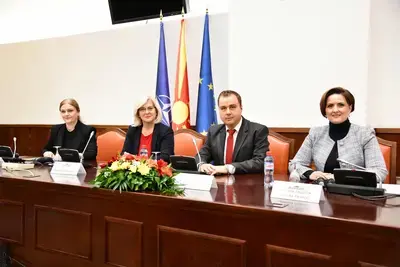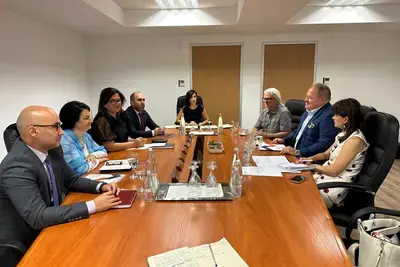
Success Story
In Serbia, NDI Staff Supports Parliamentary Efforts to Strenghten Governance
After years of working in Serbia on political party development and elections, NDI has shifted its focus to aiding those who hold elective office, a reflection of the country's increased political stability. Rebecca Shoot, a resident program officer in NDI's Belgrade office, discusses the Institute's work with parliamentarians in Serbia's National Assembly.
What led NDI to focus on strengthening the Serbian parliament?
The 2008 elections were a turning point for Serbia in many ways. The elections confirmed Serbia's course as an emerging democracy that wanted to move toward membership in the European Union (EU). The Institute had worked on legislative and governance programs for some time, but, with the electoral landscape more settled, we were able to significantly ramp up parliamentary activity.
Describe the parliamentary development program. What are the components?
The parliamentary assistance program has five pillars. Each seeks to bolster the three professional functions of members of parliament (MPs): representative, legislative and oversight. These five pillars are: improving constituency relations, launching a parliamentary internship program, convening public hearings and other events to incorporate citizen input in the legislative process, augmenting the legislative skills of new or inexperienced MPs, and working with MPs to implement a Law on Parliament and to amend the Rules of Procedure.
The first pillar — the constituency relations program — is in some ways the heart of the program. In early 2009 we worked with the National Assembly to launch the first of five constituency offices.
"MPs are beginning to see the results and positive aspects of engaging directly with the electorate."
Serbia is a single district electoral system, meaning that MPs are chosen from political party lists and represent all of Serbia, not a geographically-defined constituency. Therefore, there is little incentive for MPs to connect directly to constituents, and elections tend to focus on big-picture issues, such as foreign relations, rather than targeted public policies.
Through our program, 14 MPs have opened constituency offices around Serbia. They hold office hours on a monthly basis and conduct monthly public events. And now, the MPs are beginning to see the results and positive aspects of engaging directly with the electorate.
What benefits are the participating MPs seeing?
For example, one MP was recently visited by the dean of the University of Belgrade's Economics Faculty to the constituency office in the central Belgrade district of Savski Venac. The dean and his students had reservations about a new draft Law on Higher Education. The students disagreed with a provision that would require those who fail the oral or written component of an end-of-year exam to retake the entire course from the beginning, arguing that it would force many to prolong their studies unnecessarily. The MP advised the dean and students on how to lobby effectively for changes to the law.
The MP has since become actively involved in the legislation, and he has maintained a personal relationship with these young voters in his constituency who may now be motivated to participate in upcoming elections. The students are seeing their specific changes to the law being considered and are more engaged in the political process.
Each of the offices has its own character and faces unique challenges. We have one constituency office in Novi Pazar, in the Sandzak region of southwestern Serbia. The heavily Bosniak area is geographically isolated from Belgrade. While that office has more difficulty attracting constituents and resolving their complaints with Belgrade-based institutions, the rewards are even greater when you see a constituent getting his or her query answered when before there was simply no mechanism, no outlet for them whatsoever.
 Slavica Dukic Dejanovic, president of National Assembly, cuts the ribbon at the opening for the constituency office in Zrenjanin.
Slavica Dukic Dejanovic, president of National Assembly, cuts the ribbon at the opening for the constituency office in Zrenjanin.We've just recently open the fifth constituency office in the municipality of Zrenjanin in Serbia's northern province of Vojvodina. The multiparty office – the largest to date – includes seven MPs from six political parties. The office is tri-lingual, with constituency office assistants fluent in Hungarian, Romanian and Serbian to serve Zrenjanin's diverse population.
You mentioned the second pillar, the internship program. What's the objective of that program?
We launched the parliamentary internship program on May 1. Twenty-four final year college students were selected to participate, all majoring in subjects relevant to the various committees with which they work.
There are two goals for the project. The first is to get young people involved and interested in the political process and provide them with work experience, as there is not a practice of professional internships in Serbia. Second, we hope the interns can support parliamentary staff. If MPs want to research comparative legislation on the law of employment, for example, they have extremely limited staff and resources at their disposal. The MP ends up doing most of the research on a personal computer and on personal time. Having student interns who have a little bit of background in the field will, we hope, increase MPs' ability to research, draft and oversee quality legislation.
Can you explain how NDI is working with the new and entering MPs?
We held an orientation session for incoming MPs in 2008 to introduce their roles and responsibilities, and acquaint them with the parliament's resources at their disposal. At the event, a group of young legislators representing multiple parties was especially engaged and realized the potential benefits of working together in the parliament. This informal club is one of the few groups within parliament doing multiparty work and the only one to advance the voices of young people, who are traditionally alienated from the political process.
"I think citizens in Serbia are ready to get past the big policy questions that don't immediately impact their lives and they are ready to see tangible, concrete movement on simple, basic concerns."
Right now, for example, NDI and the "young MPs" club have launched a series of regional roundtables on a law on the education system that is under review by the National Assembly. These forums are bringing school officials, students, local government representatives, representatives of relevant ministries and civil society groups together for a dialogue about how this law is being implemented in schools and what role educators and students can play in the process. This is the first time anything like this has been done, and it was really initiated by the young MPs club.
What are the issues that people in Serbia are concerned about, that these new skills and programs for parliament are meant to help with?
I think most citizens are ready to get past the big policy questions that don't immediately impact their lives — the Kosovo question, for example — and they are ready to see tangible, concrete movement on simple, basic concerns. People care about their pensions. They care about the privatization of public companies and myriad other issues.
MPs are beginning to pay attention to these issues, but citizen are still highly skeptical. The approval rating for the National Assembly as a whole is lower than for any single prominent politician or institution.
Reform is happening and I see a renewed commitment to reform on the part of the Speaker and the leadership in the assembly, but it's going to be a long, uphill climb to convince people that their assembly is actually delivering.
Pictured above: Rebecca Shoot
Published on June 24, 2010



